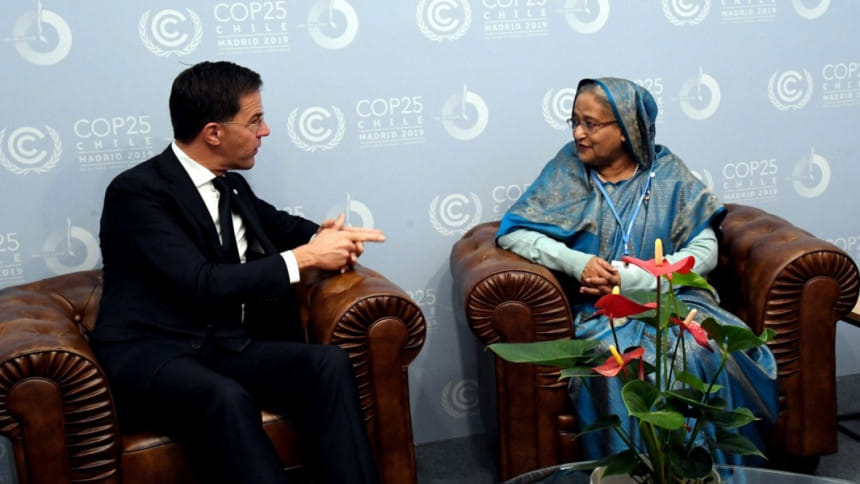An effective platform for branding Bangladesh

The 25th Conference of Parties (COP25) of the UN Framework Convention on Climate Change (UNFCCC) ended just days ago. Already, many reviews, mostly negative, have come out globally including in this newspaper. I called the COPs often a process of "active inaction" in my first book on climate politics published by Routledge in 2014. The zenith of its failure was COP15, held in Copenhagen, which the media later sarcastically called "Hopenhagen/Brokenhagen". How can COP be, then, an effective platform for branding Bangladesh?
Actually, not all COPs can be called a failure. Since the adoption of the UNFCCC in 1992, there have been a few milestones, such as COP3 which adopted the Kyoto Protocol and COP7 which adopted the Marrakech Accords, establishing three funds to support developing countries. COP13 was a success too, adopting the Bali Action Plan. It put "adaptation" on a par with "mitigation", long demanded by the developing countries. The Paris Agreement was adopted at COP21 as a universal, bottom-up process which mandated all countries to undertake emissions reduction progressively under their periodically submitted nationally determined contributions.
Yet I put the title of this piece in a very positive spirit. Based on my long years of negotiating experience, I regard UNFCCC meetings as the most public form of global diplomacy today. Why? Despite all its lacklustre performance, it has great value in branding a country like Bangladesh to global stakeholders who matter in development discourse. Let me explain.
First, climate negotiation, now the number one global agenda, is virtually development diplomacy. Since the publications of the 3rd and 4th Assessment Reports of the Intergovernmental Panel on Climate Change (IPCC) in 2001 and 2007, climate issues have begun to be treated very much as development issues. Climate change as the most diabolically complex and wicked policy problem touches the very foundational aspects of modern life and development. Without mainstreaming climate change into the development strategy, no country can achieve the Sustainable Development Goals (SDGs). Bangladesh is already ahead in putting a policy-institutional framework along this trajectory. Despite all the climate adversities that keep pounding us each year, we are achieving a growth rate of about 8 percent. This sounds like a miracle to many foreigners.
Second, a huge number of participants attend these negotiations at least twice—in May/June and November/December—each year. No other global negotiations happen so openly, under one roof, with the participation of so many delegates from 197 governments, observers representing a variety of stakeholders, such as NGOs of many hues, bilateral and multilateral agencies, think tanks and journalists. According to one estimate, an average of 25,000 participants attend each meeting. All these stakeholders keep their eyes and ears open to know what's happening around.
Third, since 2014, the UNFCCC has been working on a Gender Action Program and the COP25 initiated a roadmap for implementation of the Action Plan. Bangladesh already has adopted a Gender and Climate Action Plan years back. In gender parameters, Bangladesh stands out among South Asian and many other developing countries including in girls' education, which is one key to solving the climate crisis. This deserves to be shared at COPs.
Fourth, the Chilean presidency was active in promoting this COP as a Blue COP. Before and during the COP, several events took place highlighting the role of oceans in tackling climate change. Just a few months ago, the IPCC published a special report on oceans and cryosphere which highlighted the impacts of climate change and how the oceans can contribute to addressing the problem. The next COP is likely to adopt "oceans and climate change" as a formal agenda. With the successful delimitation of our maritime boundaries with neighbours, Bangladesh is now developing a Blue Strategy, which is of utmost importance for such a small landmass. So Bangladesh does have concerns to raise at COPs.
Fifth, climate change and human and national security issues are getting intertwined and being recognised as such globally. The UN General Assembly and Security Council got involved with this a decade ago and it will gain further momentum. With its potential to trigger largescale climate-induced displacement thanks to global sea level rise, climate change is very much an existential threat for us, like for many small island states. Here, COP is the forum where we can raise our concerns on this.
Sixth, Bangladesh as a graduating country from the LDCs has a high moral/ethical ground in climate diplomacy. We are innocent victims of actions taken beyond our borders. The major emitters, particularly from developed countries, resort to double standards and moral corruption. While they impose carbon tax or other market instruments in limiting emissions within their borders, they enjoy freeriding in exporting emissions into a borderless atmosphere. They continue to see national interests through the centuries-old, national-territory-based Westphalian sovereignty, held still so dearly by many powers, old and new. But climate change violates the basic human and development rights of vulnerable counties like ours. The no-harm rule is a sacrosanct principle in Western legal system. Obviously, we need a new lens of "pooled sovereignty" with enlightened interests to solve global commons issues like atmospheric instability. With its increasingly declining aid dependency, Bangladesh must lead the way to make the collective voice louder.
Now let me explicate the benefits that the Pavilion of Bangladesh obtained at COP25. Organising this for the first time is just a beginning of showcasing our country. Attended by foreign and Bangladeshi delegates, we were able to project many different faces of Bangladesh. From having the image of one of the most vulnerable, we had been able to change the narrative to a model of adaptation. This is now recognised globally. Ban Ki-moon calls Bangladesh a "teacher" in adaptation to learn from. Prime Minister Sheikh Hasina, an active leader in climate diplomacy, calls Bangladesh the world's "adaptation capital". So, such a pavilion can reinforce this narrative in COP meetings, which can rightly be regarded as a microcosm of the globe.
In the end, let me reiterate a few issues that Bangladesh should do as preparations for the next COP.
Our garment sector, which drives our export economy, is impacted by climate change in different direct and indirect ways. Based on solid research, we can project the negative impacts on the sector and how the global community can support us to achieve a low-carbon manufacturing process. Already, Bangladesh stands out in having the highest number of environment-friendly garment factories. This year at COP25, IDCOL had an effective presence, and we should encourage more such private-sector participation to showcase their processes and products.
Next, we should initiate some research in earnest on blue economy, to look for its potential and pitfalls from the perspective of climate change. This should be presented at a side event in Bangladesh Pavilion. Finally, the Bangladesh delegation, I must say, fares well in the negotiations. We have the potential of doing a lot better, given that more rigorous homework is done. This warrants analytical exercises well before each meeting to generate novel ideas for consensus-building. For the purpose, the Ministry of Environment, Forest and Climate Change, Ministries of Foreign Affairs and Finance, Economic Relations Division, Planning Commission, along with NGOs and the private sector must work together to put greater efforts in building the capacity of negotiators, focusing on the young generation, to hold our flag aloft in the most visible, most widely-publicised global diplomatic forum.
Mizan R Khan is Deputy Director, International Centre for Climate Change and Development (ICCCAD), and Program Director, LDC Universities Consortium on Climate Change (LUCCC).

 For all latest news, follow The Daily Star's Google News channel.
For all latest news, follow The Daily Star's Google News channel. 



Comments